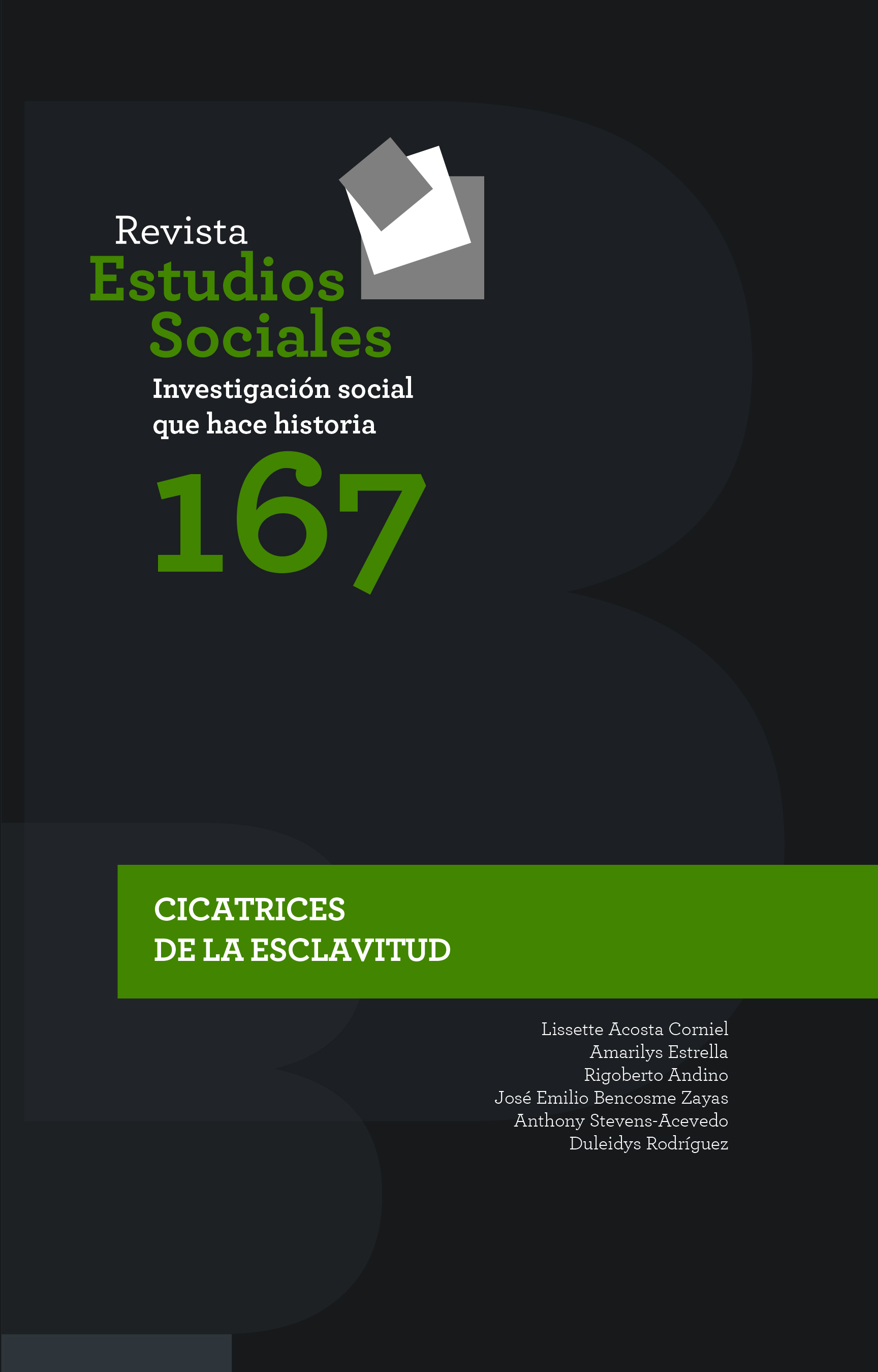1872 Slave Registry for Mayagüez, Puerto Rico: An Analysis
Rigoberto Andino
Borough of Manhattan Community College, CUNY, Department of Ethnic and Race Studies randino@bmcc.cuny.eduPublished : 2023-05-24
Section : Scientific articles
Abstract
This article examines the 1872 slave registry for Mayagüez, Puerto Rico. The 1872 slave registry is a document compiled before the formal emancipation of slavery in 1873. This analysis, unlike previous ones, explores the categories in the registry that arguably provide a glimpse of the kinds of cash crops grown in this municipality. The categories examined include kinship ties (marriage and children), manumission status (courtacion), geographical location (ward, neighborhood (barrio), or jurisdiction) and filiation (age, origin, sex, and somatic characteristics or phenotype). What is different from previous studies that review a portion of the 1872 slave registry is that it considers the number of slaves held or owned by individual slave holders/owners. In this analysis slave holdings frame the relationship between geographical location and commodity production. Spatial location and the size of slave holdings contribute to what this article contends shapes the geography of commodity production in nineteenth century Mayagüez, Puerto Rico.
How to Cite
References
Andino, Rigoberto. “Coffee, Sugar, Enslaved Labor and The Social Production of Space: Slavery In The Municipality of 1872 Mayagüez, Puerto Rico.” ProQuest Dissertation Publishing, 2019. Bergad, Laird W. Puerto Rico, puerto pobre: Coffee and the growth of agrarian capitalism in nineteenth century Puerto Rico. Ann Arbor: University of Michigan Press, 1980.
Bergad, Laird W. Coffee and Growth of Agrarian Capitalism in Nineteenth-Century Puerto Rico. Princeton: Princeton University Press, 1983.
Bergad, Laird W. “Coffee and Rural Proleterianization in Puerto Rico, 1840-1898.” Journal of Latin American Studies 15, nº 1 (1983): 83-100.
Berlin, Ira, and Philip D. Morgan. The Slaves’ Economy: Independent Production by Slaves in the Americas. London: Frank Cass, 1991.
Clark-Pujara, Christy. “Spaces of Enslavement: A History of Slavery and Resistance in Dutch New York by Andrea C. Mosterman (review).” The William and Mary Quarterly 79, nº 3 (2022): 477-480.
Curtin, Philip D. The Rise and Fall of the Plantation Complex: Essays in Atlantic History. Cambridge: Cambridge University Press, 1990.
Dietz, James L. Economic History of Puerto Rico: Institutional Change and Capitalist Development. New Jersey: Princeton University Press,1986.
Emory University. The Trans-Atlantic Slave Trade Database. Accessed 2018. http://www.slavevoyages.org/voyages/. n.d.
Jones, Martha S. “Time, Space, and Jurisdiction in Atlantic World Slavery: The Volunbrun Household in Gradual Emanicipation New York.” Law and History Review 29, nº 4 (2011): 1031-1060.
Lefebvre, Henri. The Production of Space. Oxford: Blackwell Publishers, 1991.
Marger, Martin N. race & ethnic relations: American and Global Perspectives: Tenth Edition. Stamford, CT: Cengage Learning, 2015.
Martínez-Vergne, Teresita. Capitalism in Colonial Puerto Rico: Central San Vicente in Late Nineteenth Century. Florida: University Press of Florida, 1992.
Mayo Santana, Raúl, and Mariano Negrón Portillo. La esclavitud menor: la esclavitud en los municipios del interior de Puerto Rico
en el siglo XIX. Puerto Rico: Centro de Investigaciones Sociales, Universidad de Puerto Rico, 2007.
Negrón Portillo, Mariano, and Raúl Mayo Santana. La esclavitud urbana en San Juan. Puerto Rico: Huracán Ediciones / Centro de Investigaciones Sociales, Universidad de Puerto Rico, 1992. Nistal-Moret, Benjamín. “Problems in the Social Structure of Slavery in Puerto Rico during the Process of Abolition.” In In Between Slavery and Free Labor, The Spanish-Speaking Caribbean In The Nineteenth Century, edited by Manuel Moreno Fraginals,
Frank Moya Pons, and Stanley L. Engerman, 141-157. Baltimore: The John Hopkins University Press, 1985.
Omi, Michael, and Howard Winant. Racial Formation in the United States From the 1960s to the 1990s. New York: Routledge, 1994.
Picó, Fernando. Historia general de Puerto Rico. Puerto Rico: Ediciones Huracán, 1986.
Picó, Fernando. Libertad y servidumbre en el Puerto Rico del siglo XIX. 3rd. Ed. Puerto Rico: Ediciones Huracán, 1983.
Picó, Fernando Ponce y los rostros rayados: Sociedad y esclavitud 1800-1830. San Juan: Ediciones Huracán, 2012.
Radetzki, Marian, and Linda Wårell. “The Geography of Commodity Production and Trade.” A Handbook of Primary Commodities in the Global Economy. 2nd ed., 28-55. Cambridge University Press, 2016. doi:10.1017/9781316416945.003.
Scarano, Francisco A. Sugar and Slavery in Puerto Rico: The Plantation Economy of Ponce, 1800-1850. Madison, Wisconsin: The University of Wisconsin Press, 1984.
Scarano, Francisco A. “The Origins of Plantation Growth in Puerto Rico.” In Caribbean Freedom: Economy and Society from Emancipation to the Present, comp. by Hilary Beckles and Verene Shepherd, 56-68. New York: The New Press, 1991.
Scarano, Francisco A. Hacienda Barracones: Azucar y esclavitud en
Ponce Puerto Rico 1800-1850. Puerto Rico: Ediciones Huracán, 1993.
Scarano, Francisco A. Puerto Rico: Cinco siglos de historia. 2ª ed.
México, D.F: McGraw Hill Interamericana, 2000.
Secretaria del Gobierno Superior Civil. “Registro Central De Esclavos 1872: 4 Departamento.” Archivo General de Puerto Rico, n.d.
Silvestrini-Pacheco, Blanca, and María Dolores Luque de Sánchez. Historia de Puerto Rico: trayectoria de un pueblo. San Juan: Ediciones Culturales, 1992.
Stark, David M. “A New Look at the African Slave Trade in Puerto Rico Through the use of Parish Registers: 1660-1815.” Slavery
& Abolition: A Journal of Slave and Post-Slave Studies 30, nº 4 (2009): 491-520.
Vega Lugo, Ramonita. Urbanismo Y Sociedad: Mayagüez de Villa a Cuidad 1836-1877. Puerto Rico: Academia Puertorriqueña de la Historia, 2009.
License
Copyright (c) 2024 Revista Estudios Sociales

This work is licensed under a Creative Commons Attribution-NonCommercial-NoDerivatives 4.0 International License.



